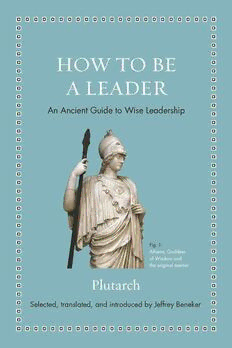
How to Be a Leader: An Ancient Guide to Wise Leadership PDF
Preview How to Be a Leader: An Ancient Guide to Wise Leadership
HOW TO BE A LEADER Ancient Wisdom for Modern Readers How to Be a Leader: An Ancient Guide to Wise Leadership by Plutarch How to Think about God: An Ancient Guide for Believers and Nonbelievers by Marcus Tullius Cicero How to Keep Your Cool: An Ancient Guide to Anger Management by Seneca How to Think about War: An Ancient Guide to Foreign Policy by Thucydides How to Be Free: An Ancient Guide to the Stoic Life by Epictetus How to Be a Friend: An Ancient Guide to True Friendship by Marcus Tullius Cicero How to Die: An Ancient Guide to the End of Life by Seneca How to Win an Argument: An Ancient Guide to the Art of Persuasion by Marcus Tullius Cicero How to Grow Old: Ancient Wisdom for the Second Half of Life by Marcus Tullius Cicero How to Run a Country: An Ancient Guide for Modern Leaders by Marcus Tullius Cicero How to Win an Election: An Ancient Guide for Modern Politicians by Quintus Tullius Cicero HOW TO BE A LEADER An Ancient Guide to Wise Leadership Plutarch Selected, translated, and introduced by Jeffrey Beneker PRINCETON UNIVERSITY PRESS PRINCETON AND OXFORD Copyright © 2019 by Princeton University Press Published by Princeton University Press 41 William Street, Princeton, New Jersey 08540 6 Oxford Street, Woodstock, Oxfordshire OX20 1TR press.princeton.edu All Rights Reserved Library of Congress Cataloging-in-Publication Data Names: Plutarch, author. | Beneker, Jeffrey, editor, translator, writer of introduction. | Plutarch. Moralia. Selections. | Plutarch. Moralia. Selections. English. Title: How to be a leader : an ancient guide to wise leadership / Plutarch ; edited, translated, and introduced by Jeffrey Beneker. Description: Princeton : Princeton University Press, [2019] | Series: Ancient wisdom for modern readers | In Ancient Greek with parallel English translations on facing pages. Identifiers: LCCN 2019019549 | ISBN 9780691192116 (hardcover) Subjects: LCSH: Plutarch—Translations into English. | Leadership— Early works to 1800. Classification: LCC PA4368 .A23 2019 | DDC 873/.01—dc23 LC record available at https://lccn.loc.gov/2019019549 British Library Cataloging- in- Publication Data is available Editorial: Rob Tempio and Matt Rohal Production Editorial: Ali Parrington Text and Jacket Design: Pamela L. Schnitter Production: Merli Guerra and Brigid Ackerman Publicity: Jodi Price, Amy Stewart, and Alyssa Sanford Jacket/Cover Credit: The Athena Giustiniani, or Giustiniani Minerva. Parian marble. Antonine Roman copy, 2nd century. Detail. Prisma Archivo / Alamy Stock Photo This book has been composed in Stemple Garamond LT, Futura and Brill Printed on acid- free paper. ∞ Printed in the United States of America 1 3 5 7 9 10 8 6 4 2 For Helen and Luis CONTENTS Introduction ix Notes on the Translation and Greek Text xxi To an Uneducated Leader 1 How to Be a Good Leader 41 Should an Old Man Engage in Politics? 191 Important Persons and Terms 341 Notes 365 INTRODUCTION If you were a builder or stonecutter in the year 100 CE and happened to live near Chaeronea, a small city in central Greece, you might have been hired by Plutarch for a public works project. He would have been in his mid- fifties, too old to perform any heavy lifting himself, but eager to represent the people of Chaeronea and to supervise your work. And if you asked him why he— a learned and prolific writer who had studied in Athens, lectured in Rome, and made connections among the highest ranks of imperial society— bothered with such mundane local matters, like the installation of roofing tiles and the pouring of cement, ix INTRODUCTION he would have said, “I’m not building these things for myself, but for my native city.” “City before self,” in fact, might have been a motto that you heard him repeat quite often. It was certainly the basic principle of his political thought, especially as that thought is expressed in the three essays in- cluded in this collection: To an Uneducated Leader, How to Be a Good Leader, and Should an Old Man Engage in Politics? For centuries leading up to Plutarch’s time, the city had been the fundamental political unit of the Greek world. Often re- ferred to as city- states, Greek cities before the advent of the Roman Empire were in- dependent entities, with their own armies, foreign policy, trade, and political systems. Under Roman control, and so in Plutarch’s day, they remained semi- independent, no longer involved directly in wars or foreign x
